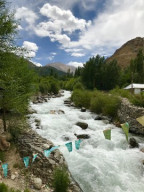
Residents of Gilgit are facing a host of issues ever since curfew was clamped on the city last week after a surge in sectarian violence, forcing people to remain indoors and creating a water and food crisis.
Water supply to Gilgit was suspended last Tuesday after violence erupted in the city, which gradually engulfed the whole region, leaving 20 people dead and 50 others wounded.
“There is no water in our area since last week. It’s really difficult given that we cannot go out to fetch water,” Shahzad, a resident of Jutial told The Express Tribune by telephone.
With the city under curfew and cellular networks jammed, landlines are the only means of communication available to residents, for the past week.
Amina, a housewife in Kashrote, said that they were without water for the past three days. A neighbour had shared some water with her during the initial three days but that too had dried up on Saturday. “We are very worried; there is no one to resolve our problems,” she added.
According to information gathered by The Express Tribune, areas deprived of water since last Tuesday include Jutial, Khomer, Nagral, Kashrote, Majini Mohalla, Hospital Colony, Zulfiqar Colony and Amphery, where thousands of people are virtually imprisoned inside their homes because of round-the-clock curfew till last week.
Residents cannot even register their complaints with the authorities since municipal offices have been closed as well since the eruption of violence.
A senior administration official, when contacted, said he had no idea when the curfew would be lifted, given that the control of the city had passed to the army. “I cannot say when the situation will normalise.”
The threat of starvation in the violence-hit city is also very real as people cannot go out to buy food items during curfew, while stocks of vegetables and fruits in markets are rotting away.
“When I visited my shop eight days later during a break in the curfew, I found that most fruits and vegetables were spoilt,” said Deen Muhammad, a greengrocer in Gilgit. He was amongst those who had opened their shops for a brief interval on Monday.
Muhammad said his business had suffered a loss of thousands of rupees, the only source of income for his family, because of the curfew.
The round-the-clock curfew was clamped on April 3, by the army after masked men attacked a Sunni rally with a hand grenade in Gilgit.
In reprisals in Sunni-dominated Chilas, passenger buses were attacked and set on fire. At least 10 Shias were killed in the retaliatory attacks.
Food items are transported to Gilgit-Baltistan from other parts of the country. According to various merchants, they had received their stocks of fruits and vegetables before the violence occurred, which they could not sell earlier due to the abrupt shutdown.
“There are several crates of oranges, tomatoes, and potatoes which are all rotting gradually with the passage of time,” said another greengrocer.
However, according to residents of Jutial, people even purchased the rotten items during a break in the curfew, fearing that if they did not buy now, they would be forced to starve in the coming days.
In Gilgit and neighbouring areas, scores of labourers from Khyber-Pakhtunkhwa and Ghizer districts are going hungry as they cannot go out for food due to restrictions placed on movement and the closure of markets.
In Kashrote, residents voluntarily distributed food to labourers stuck in the midst of violence. Khan Zaman, a labourer, said that he had nothing to eat last night but his neighbours had supplied food to him.
Reports of hunger and starvation have also poured in from Amphery, Jutial and Skardu, where escalating violence has crippled
routine life.
Published in The Express Tribune, April 11th, 2012.




1732745394-0/Diddy-(4)1732745394-0-165x106.webp)



1730886375-0/Untitled-design-(46)1730886375-0-270x192.webp)








COMMENTS
Comments are moderated and generally will be posted if they are on-topic and not abusive.
For more information, please see our Comments FAQ